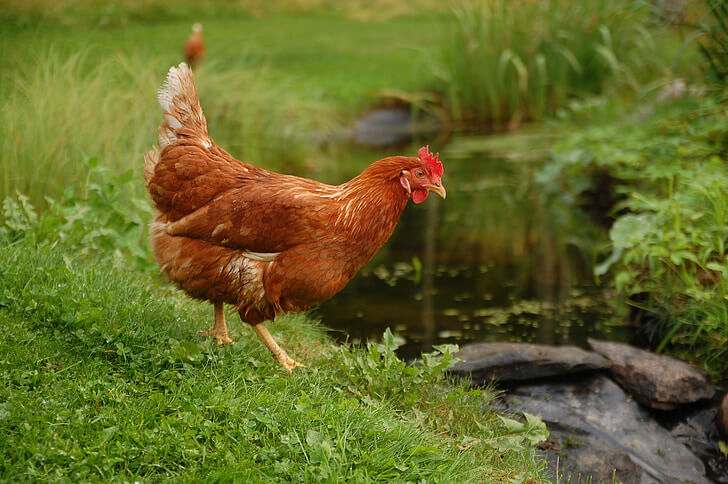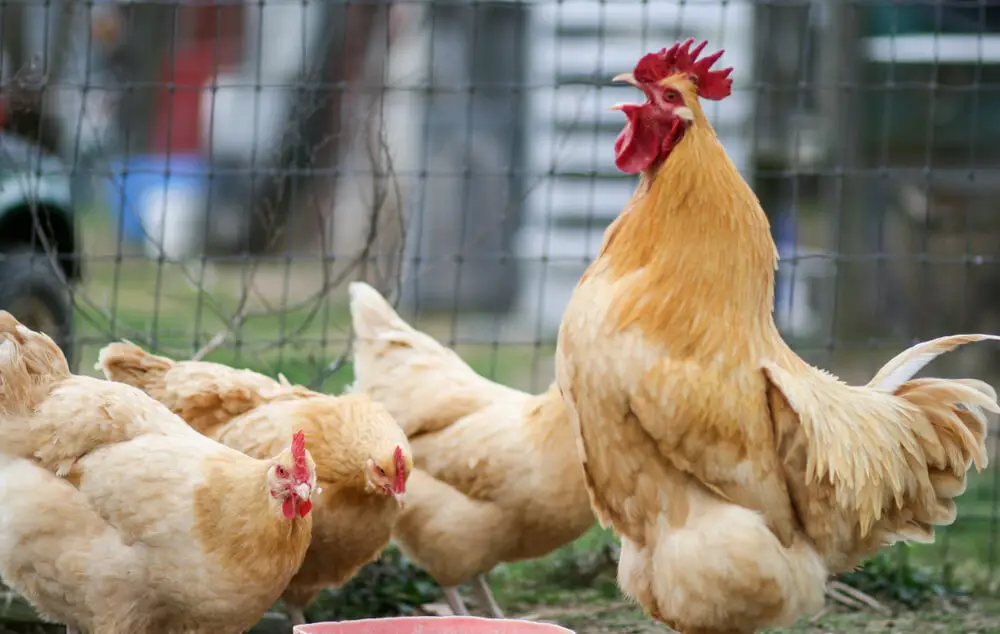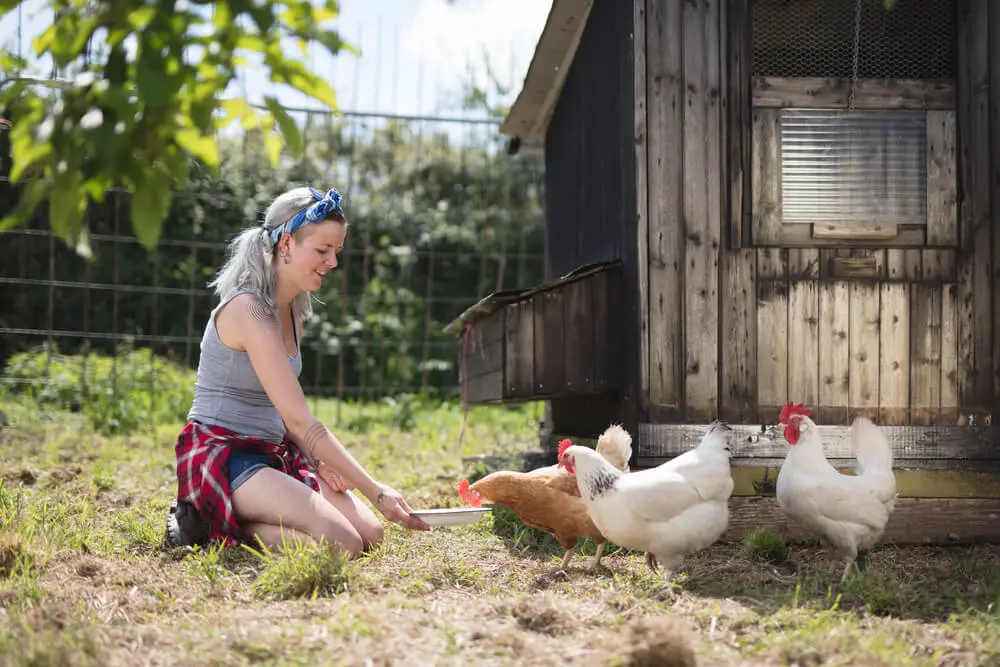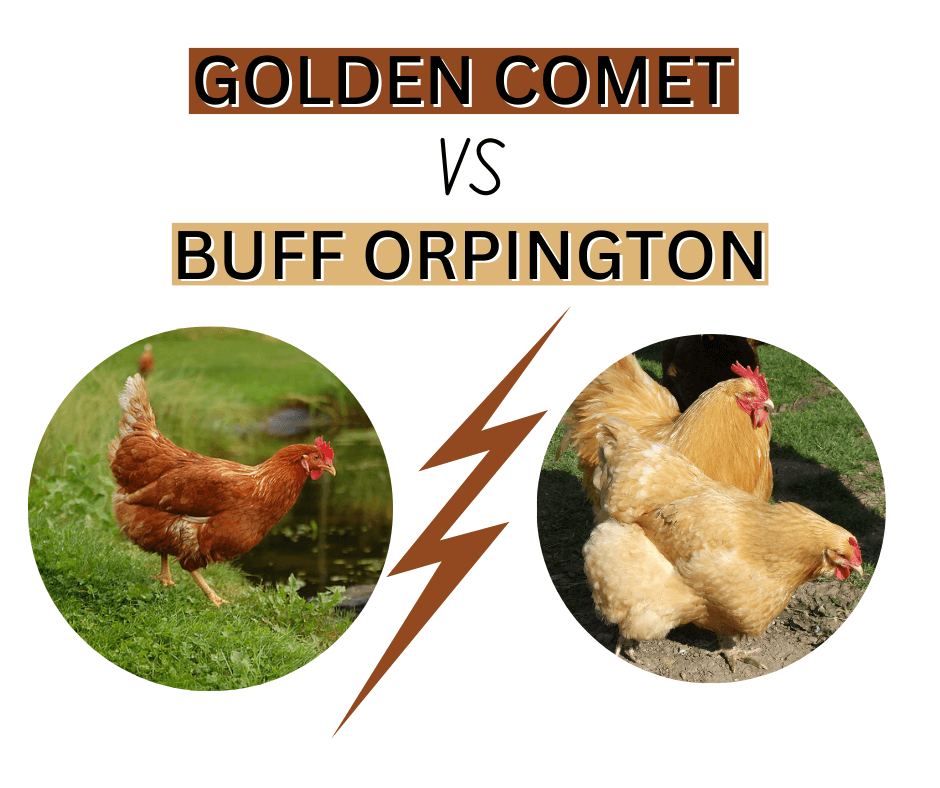Hey there fellow chicken enthusiasts! If you’re considering starting your own backyard flock, one of the first decisions you’ll need to make is which breed of chicken to raise. There are countless options out there, each with their own unique characteristics and advantages, but today we’re going to focus on two of the most popular: the Golden Comet and the Buff Orpington.
Both of these breeds are known for their friendly personalities, easygoing nature, and excellent egg-laying abilities, but there are some key differences between them that may make one more suitable for your particular situation. In this article, we’ll take a closer look at the Golden Comet and the Buff Orpington, comparing their size, temperament, egg-laying capabilities, and other factors to help you determine which breed is the best fit for your backyard flock.
So whether you’re a seasoned chicken keeper looking to add some new birds to your flock, or a beginner considering raising chickens for the first time, keep reading to find out everything you need to know about these two wonderful breeds!
In this article, we’ll compare and contrast Golden Comet and Buff Orpington, as well as answer some frequently asked questions about these breeds.
Golden Comet-Breed Information

Golden Comet Chickens were first developed in the 1950s by crossing Rhode Island Red Chicken and the White Leghorn Chicken. They are known for their hardiness, docile temperament, and prolific egg-laying capabilities. Golden Comet Chickens have reddish-gold plumage with white tail feathers and a calm disposition that makes them ideal for backyard flocks.
Golden Comet Egg Color
Golden Comet Chickens lay large brown eggs that are prized by egg enthusiasts for their nutritional content and rich flavor. Their eggs are comparable in size and color to other popular brown egg-laying breeds such as the Rhode Island Red and Plymouth Rock.
Golden Comet Lifespan
On average, Golden Comet Chickens can live up to 8 years with proper care. They require a balanced diet, adequate shelter, and protection from predators to ensure a long and healthy life.
Health
Golden Comet Chickens are generally hardy birds, but like all chickens, they are susceptible to certain health issues. Common health issues in Golden Comet Chickens include respiratory infections, egg-laying problems, and parasites such as mites and lice.
Regular health checks and preventative measures such as proper sanitation and biosecurity can help keep your flock healthy.
Molting
Molting is a natural process in which chickens shed their old feathers and grow new ones. Golden Comet Chickens typically molt once a year, usually in the fall, and may experience a temporary decrease in egg production during this time. Providing a balanced diet rich in protein and essential vitamins and minerals can help support healthy feather growth during molting.
Housing
Golden Comet Chickens require a secure and comfortable living environment that provides adequate space, ventilation, and protection from predators. A standard coop size for 3-4 Golden Comet Chickens is around 4 square feet per bird, with a minimum of 10 square feet of outdoor space per bird.
Diet
A balanced diet is essential for healthy Golden Comet Chickens and optimal egg production. They require a diet that is high in protein, vitamins, and minerals, which can be achieved through a combination of commercial feed, fresh fruits and vegetables, and occasional treats such as mealworms or scratch grains.
Golden Comet Egg Laying
Golden Comet Chickens are prolific egg layers, with the ability to produce up to 300 eggs per year. They typically start laying at around 16-18 weeks of age and continue to lay consistently for up to 3 years, with a gradual decline in production thereafter.
Golden Comet Egg Quality
Golden Comet Chicken eggs are highly prized by egg enthusiasts for their rich flavor and nutritional content. They are high in protein, vitamins, and minerals, and are often used in baking and cooking due to their superior flavor.
Buff Orpington– Breed Information

Are you considering adding Buff Orpington chickens to your backyard flock? These beautiful birds are a popular choice for chicken keepers, and for good reason. In this article, we’ll cover everything you need to know about Buff Orpingtons, from their unique characteristics to their care requirements and more.
Buff Orpingtons are known for their striking buff color and fluffy feathers, which make them a beautiful addition to any flock. But they are also great egg layers, producing large brown eggs that are perfect for cooking and baking.
These chickens are known for their friendly and docile temperament, making them a great choice for families with children or those who want to keep them as pets.
Health and Care: Buff Orpington Health
Like all chickens, Buff Orpingtons require proper care to stay healthy and happy. Regular check-ups with a veterinarian who specializes in poultry can help ensure your birds are in good health. Additionally, providing them with a balanced diet of chicken feed, vegetables, and occasional treats will keep them healthy and happy. It’s also important to keep their living area clean and free of pests to prevent illness.
Housing and Environment: Buff Orpington Coop
Buff Orpingtons require a coop and outdoor area that provides them with plenty of space to move around. The coop should be secure to protect them from predators and should be well-ventilated to prevent respiratory issues. Additionally, providing them with a place to dust bathe and perch will help keep them comfortable and healthy.
Breeding and Incubation: Buff Orpington Incubation
If you’re interested in breeding Buff Orpingtons, it’s important to understand the process of incubation and hatching. Temperature and humidity levels need to be carefully monitored to ensure successful hatching. It’s also important to consider the genetic diversity of your breeding stock to prevent inbreeding.
Uses and Products: Buff Orpington Meat
Buff Orpingtons are also a great choice for those interested in producing their own meat. They have a unique taste and quality that sets them apart from other breeds. If you’re interested in raising Buff Orpingtons for meat, it’s important to understand the process of processing and cooking the meat to ensure it’s safe and delicious.
Pros & Cons – (Golden Comet vs Buff Orpington)
Golden Comet Chickens are a hybrid breed that were created by crossing Rhode Island Reds and New Hampshire Reds. They are known for their friendly personalities, hardiness, and excellent egg-laying capabilities. Here are some pros and cons of the Golden Comet breed:
Pros:
- Excellent egg-laying capabilities, with the ability to produce up to 300 large brown eggs per year
- Docile temperament, making them great for families with children or those who want to keep them as pets
- Hardy birds that can withstand cold weather and are resistant to many common chicken diseases
- Beautiful reddish-gold plumage with white tail feathers
Cons:
- Can be flighty and may try to escape their enclosure
- May experience a temporary decrease in egg production during molting season
- Susceptible to respiratory infections, egg-laying problems, and parasites such as mites and lice
Buff Orpington Chickens are a heritage breed that originated in England in the late 1800s. They are known for their striking buff color, fluffy feathers, and excellent egg-laying capabilities. Here are some pros and cons of the Buff Orpington breed:
Pros:
- Excellent egg-laying capabilities, with the ability to produce up to 280 large brown eggs per year
- Docile temperament, making them great for families with children or those who want to keep them as pets
- Beautiful buff-colored plumage with fluffy feathers
- Hardy birds that can withstand cold weather and are resistant to many common chicken diseases
Cons:
- Can be prone to broodiness, which can decrease egg production
- May require more grooming and cleaning due to their fluffy feathers
- Can be more expensive to purchase than other breeds due to their popularity
FAQs About Golden Comet and Buff Orpington Chickens:
How long do Golden Comet and Buff Orpington chickens live?
Both breeds can live up to 8 years with proper care.
What is the average size of a Golden Comet or Buff Orpington chicken?
Golden Comet Chickens weigh around 4-5 pounds, while Buff Orpington Chickens weigh around 7-8 pounds.
Do Golden Comet and Buff Orpington chickens get along with other chicken breeds?
Yes, both breeds are known for their friendly personalities and should get along well with other chicken breeds.
How many eggs do Golden Comet and Buff Orpington chickens lay per year?
Golden Comet Chickens can lay up to 300 eggs per year, while Buff Orpington Chickens can lay up to 280 eggs per year.
What kind of diet do Golden Comet and Buff Orpington chickens require?
Both breeds require a balanced diet that is high in protein, vitamins, and minerals. This can be achieved through a combination of commercial feed, fresh fruits and vegetables, and occasional treats such as mealworms or scratch grains.
In conclusion, both Golden Comet and Buff Orpington chickens are great choices for backyard chicken keepers. They are both friendly, hardy, and excellent egg layers. The choice ultimately comes down to personal preference and what characteristics are most important to you.
Conclusion
In conclusion, both the Golden Comet and Buff Orpington are excellent choices for backyard chicken enthusiasts. They are known for their friendly personalities, easygoing nature, and exceptional egg-laying abilities. However, when it comes down to choosing one breed over the other, there are a few factors to consider.
If you’re looking for a smaller, more efficient bird that will lay lots of eggs and doesn’t require as much space or food, then the Golden Comet may be the way to go. On the other hand, if you have a larger backyard and want a bird that’s more docile and has a fluffy, attractive appearance, then the Buff Orpington may be the better choice.
Ultimately, the decision comes down to your specific needs and preferences. By weighing the pros and cons of each breed, you’ll be able to determine which one is the best fit for your backyard flock. Whatever you choose, raising chickens is a rewarding and enjoyable hobby that will bring you joy and fresh eggs for years to come.

Shannon Stansberry has been engaged in the business of raising chickens for more than 12 years. In 2016, she accomplished the Agriculture & Natural Resources program at Mt. San Antonio College. At present, she tends to more than 80 chickens on her 4-hectare farm. Shannon regularly shares her insights and experience on how to raise healthy and contented chickens on the platform Typesofchickens.com

